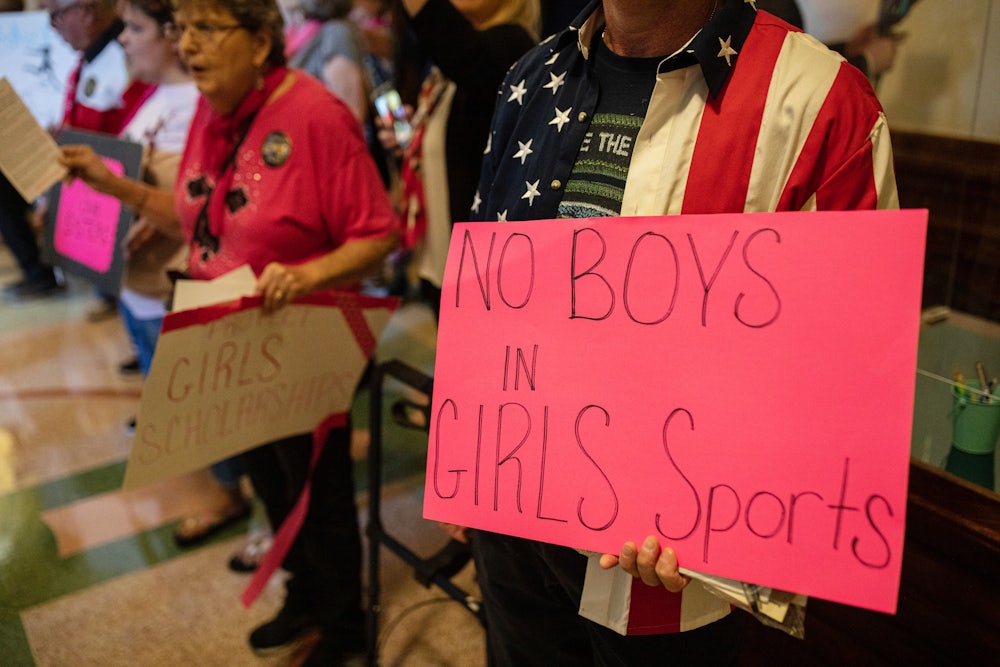In the coming days, Texas Governor Greg Abbott will sign a bill banning trans kids in his state from playing on a sports team that matches their gender identity. No matter that the state already has a restrictive policy; as it stands, if a trans girl in Texas wishes to play on the girl’s volleyball team or run track and field with her peers, she has to modify her birth certificate, a process that requires no small amount of time and money. The new bill, H.B. 25, removes even that option. Dressed up in language asserting the need to protect young girls, we should recognize what H.B. 25, like its counterparts in other states, is at its heart: an assertion of the state’s control over bodily autonomy. Where have we seen this before?
It was by no means certain that H.B. 25 would pass. A similar bill died during the regular legislative session, only for the idea to be revived in each of the three special sessions called by Abbott this summer and into the fall. But last week, the heavily Republican House approved the bill, all but guaranteeing that Abbott will sign it into law. Texas now has the distinction of being the largest state—joining nine others, including Florida and Tennessee—to pass a version of this discriminatory bill. H.B. 25 is only the beginning: In July, Abbott vowed to find new ways to restrict gender-affirming care after a bill that would have banned treatment, including puberty blockers, failed to pass. Several other Republican-led states have moved to pass similar legislation criminalizing doctors who provide such care to young people. These bills’ supporters have painted gender-affirming, at times lifesaving, care as “child abuse.” The raft of new laws represents a coordinated assault, meant to legislate trans kids out of public life and out of existence. They are, as the ACLU attorney Chase Strangio described them to me last year, “the most relentless legislative attacks on trans lives that I have ever seen.”
Abbott’s political motivations are fairly obvious at this point. He’s up for reelection next year and faces two challengers who are already attacking him for not being conservative enough. In August, state officials deleted two webpages that listed resources for LGBTQ youth after Abbott’s right-wing challenger Don Huffines described them in a tweet as promoting “transgender ideology,” and “not Texas values” and “not Republican Party values.” As Texas parent Rachel Gonzales told me earlier this year, Abbott is using trans kids like her daughter Libby as “a political bargaining chip.”
If all of this sounds vaguely familiar, that’s because it is. That H.B. 25 was passed months after Abbott signed S.B. 8, the state’s near-total ban on abortion into law, is no mere coincidence: Both laws pull from the same successful playbook. As the historian and writer Jules Gill-Peterson told The New York Times earlier this month, “Anti-abortion and anti-trans legislation are products of the same political coalition, using the same scripts and tactics.” She added, “In both cases, we see the protection of a fantasized imperiled child justifying heavy-handed police state policies that restrict actual women and children’s rights and bodily autonomy.”
And those tactics have escalated. In recent weeks and months, small groups of anti-trans activists have protested in front of children’s clinics and hospitals in cities like Boston, Seattle, Los Angeles, and New York City, a move meant to harass medical providers borrowed straight from the anti-abortion movement.
Recognizing that anti-abortion and anti-trans laws share the same root and the same ultimate goal is no mere academic exercise. For too long, these assaults have been seen as discrete and separate. Too often, those who ideally would be allied together are even at odds. (Consider the frustrating debates over whether reproductive justice advocates should use the term “pregnant woman” versus the more accurate “pregnant person.”) As the journalist Katelyn Burns wrote recently, “Instead of bickering among one another over things like gender-inclusive reproductive health language, it’s worth women and trans people looking at the bigger picture and taking note of the world conservatives are striving to create.” It’s also worth recognizing the cynicism of that world, full of warnings of innocent children under threat, invoked to shore up conservative power. As with the push to further restrict voting rights, right-wing ideology and realpolitik are working hand in hand.










